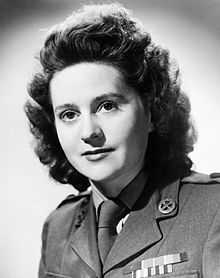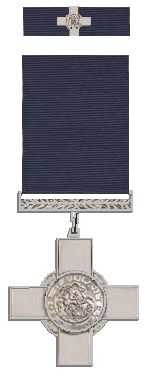Odette Hallowes
| Odette Sansom Hallowes | |
|---|---|
 Odette Sansom in 1946 | |
| Nickname(s) | Agent Spindle, Lise |
| Born |
28 April 1912 Amiens, France |
| Died |
13 March 1995 (aged 82) Walton-on-Thames, Surrey, England |
| Allegiance |
|
| Service/branch | First Aid Nursing Yeomanry |
| Years of service | 1942–1945 |
| Unit |
Special Operations Executive Spindle |
| Battles/wars | Second World War |
| Awards |
George Cross Member of the Order of the British Empire Chevalier de la Légion d'honneur (France) |
| Spouse(s) |
Roy Sansom (1931–46) Peter Churchill (1947–56) Geoffrey Hallowes (1956–95) |

Odette Sansom Hallowes GC, MBE (28 April 1912 – 13 March 1995) was an Allied intelligence agent during the Second World War.
Early years
She was born Odette Marie Céline Brailly in Amiens, France, the daughter of the First World War hero Gaston Brailly, who was killed at Verdun in 1918. At seven, she caught poliomyelitis, and spent a year blind and another without the movement of her limbs.
Roy Sansom
She met an Englishman, Roy Sansom, in Boulogne, and married him in 1931, moving with him to England. The couple had three daughters: Françoise, Lily and Marianne. Roy Sansom enlisted in 1940. In the spring of 1942, the Admiralty appealed for postcards or family photographs taken on the Continent for possible war use. Hearing the broadcast, she wrote that she had photographs taken around Boulogne, on the French coast of the English Channel, but she inadvertently addressed her letter to the War Office instead of the Admiralty. As a result, she was enrolled in Special Forces of the First Aid Nursing Yeomanry (FANY) and trained by Colonel Maurice Buckmaster's Special Operations Executive to be sent into Nazi-occupied France to work with the French Resistance. She left her three daughters in a convent school.[1]
Second World War activities in France
She made a landing near Cannes in 1942, where she made contact with her supervisor, Peter Churchill. Using the code name Lise, she brought him funds and acted as his courier. Churchill's operation in France was infiltrated by Hugo Bleicher, an Abwehr counterintelligence officer, who arrested Odette and Churchill at the Hôtel de la Poste in Saint-Jorioz on 16 April 1943; they were then sent to Fresnes Prison.[2] Although tortured by the Sicherheitsdienst (SD) using a red-hot poker at 84 Avenue Foch in Paris, she stuck to her cover story that Churchill was the nephew of Prime Minister Winston Churchill, and that she was his wife. The hope was that in this way their treatment would be mitigated.[3]
Ravensbrück
She was condemned to death in June 1943, although a time for execution was not specified, and sent to Ravensbrück concentration camp.
Odette survived the war partly thanks to her alias of "Churchill". The British had calculated that if the Germans thought she was related to the British Prime Minister, they would want to keep her alive as a possible bargaining tool.[4] And so it turned out, for with the Allies only a few miles from Ravensbrück, Camp commandant Fritz Suhren took Sansom with him and drove with her to the U.S. base to surrender to the Americans. He hoped that her supposed connections to Churchill might allow him to negotiate his way out of execution.[5]
Subsequently, Odette testified against the prison guards charged with war crimes at the 1946 Hamburg Ravensbrück Trials.[6]
Further marriages
Sansom and Odette's marriage was dissolved in 1946 and she married Peter Churchill in 1947. She was divorced from Churchill in 1956 and married Geoffrey Hallowes in the same year. Hallowes outlived her and died in 2006.
Honours
Hallowes was appointed a Member of the Order of the British Empire and was the first of three Second World War First Aid Nursing Yeomanry members to be awarded the George Cross (gazetted 20 August 1946).[7] She remains the only woman to have received the George Cross whilst alive, all other female awards to date being posthumous. She was also appointed a Chevalier de la Légion d'honneur for her work with the French Resistance.[8] In 1951, her home was burgled and the GC stolen.[9] After an appeal by her mother, it was returned with a note saying:
You, Madame, appear to be a dear old lady. God bless you and your children. I thank you for having faith in me. I am not all that bad — it's just circumstances. Your little dog really loves me. I gave him a nice pat and left him a piece of meat — out of fridge. Sincerely yours, A Bad Egg.[10]
On 23 February 2012, the Royal Mail released a postage stamp featuring Hallowes as part of its "Britons of Distinction" series.[11]
References
- ↑ Tickell, Odette, chapter 9.
- ↑ Odette Hallowes at nigelperrin.com
- ↑ Undercover: The Men and Women of the SOE, Patrick Howarth, 1980
- ↑ Juliette Pattinson, Behind Enemy Lines: Gender, Passing and the Special Operations Executive in the Second World War, Manchester University Press, 2007, p. 157
- ↑ George Lovell, Consultancy, Ministry & Mission, Continuum International Publishing Group, 2000, p. 115
- ↑ Salvesen, Sylvia (1947). Tilgi – men glem ikke (in Norwegian). Oslo: Aschehoug. pp. 303–307.
- ↑ The London Gazette: (Supplement) no. 37693. p. 4175. 16 August 1946. Retrieved 2008-05-27.
- ↑ The London Gazette: no. 39069. p. 5741. 17 November 1950. Retrieved 2008-05-27.
- ↑ The Glasgow Herald, Oct 6, 1952.
- ↑ The Sunday Herald, Oct 7, 1951.
- ↑ Ian Billings (23 February 2012). "Britons of Distinction". Gizmodo.
Further reading
- Odette, a movie made in 1950 starring Anna Neagle.
- Tickell, Jerrard (1949). Odette: The Story of a British Agent. London: Chapman & Hall..
- Starns, Penny (2010). Odette: World War Two's Darling Spy. UK: The History Press..
External links
- Biography of SOE agent Odette Hallowes at Nigel Perrin's site
- Picture of Odette Sansom Hallowes at FANY website(dead link)
|